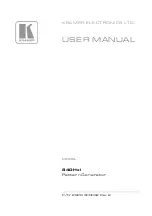
EQUIPMENT DESCRIPTION
This equipment is a revolving field, alternating current Stationary
Emergency Generator. It is powered by a gaseous fueled engine
operating at 1800 rpm for 4-pole direct drive units, 3600 rpm for
2-pole direct drive units and 2300 - 3000 rpm for quiet drive gear
units. See the Specifications section for exact numbers. The unit
comes complete with a sound attenuated enclosure, internally
mounted muffler, control console, mainline circuit breaker, bat-
tery charger, and protective alarms as explained in the following
paragraph.
All AC connections, including the power leads from the alterna-
tor, 120 volt battery charger input and control connections to the
transfer switch are available in the main connection box.
The Stationary Emergency Generator incorporates the following
alternator features:
Rotor and Stator insulation class is rated as defined by NEMA
•
MG1-32.6, NEMA MG1-1.66. The generator is self ventilated
and drip-proof constructed. Refer to the Specifications section
or the data label for the class ratings.
The voltage waveform deviation, total harmonic content of the
•
AC waveform and telephone influence factor have been evalu-
ated and are acceptable according to NEMA MG1-32.
ENGINE OIL RECOMMENDATIONS
The unit has been filled with 5W-20 engine oil at the factory. Use
a high-quality detergent oil classified “For Service SJ or SH.”
Detergent oils keep the engine cleaner and reduce carbon deposits.
When changing the engine oil, be sure to use 5W-30 engine oil.
n
Any attempt to crank or start the engine before
it has been properly serviced with the recom-
mended oil may result in an engine failure.
NOTE:
If not already equipped, it is strongly recommended to use the
optional Cold Weather Start Kit for temperatures below 32° F.
The part number for the Cold Weather Start Kit can be found
in the Specifications section or by contacting an authorized
dealer. The oil grade for temperatures below 32° F is 5W-30
synthetic oil.
COOLANT RECOMMENDATIONS
Use a mixture of half low silicate ethylene glycol base anti-freeze
and deionized water. Cooling system capacity is listed in the
specifications. Use only deionized water and only low silicate
anti-freeze. If desired, add a high quality rust inhibitor to the rec-
ommended coolant mixture. When adding coolant, always add the
recommended 50-50 mixture.
n
Do not use any chromate base rust inhibitor
with ethylene glycol base anti-freeze or chro-
mium hydroxide (“green slime”) forms and will
cause overheating. Engines that have been
operated with a chromate base rust inhibitor
must be chemically cleaned before adding eth-
ylene glycol base anti-freeze. Using any high
silicate anti-freeze boosters or additives will
also cause overheating. The manufacturer also
recommends that any soluble oil inhibitor is
NOT used for this equipment.
n
Do not remove the radiator pressure cap while
the engine is hot or serious burns from boiling
liquid or steam could result.
n
Ethylene glycol base antifreeze is poisonous.
Do not use mouth to siphon coolant from the
radiator, recovery bottle or any container. Wash
hands thoroughly after handling. Never store
used antifreeze in an open container because
animals are attracted to the smell and taste of
antifreeze even though it is poisonous to them.
3-1
Equip001 Rev.
G 05/10
Equipment Description
Summary of Contents for Stationary Emergency Generator
Page 29: ...Notes ...
Page 30: ......
Page 32: ......
Page 33: ......
Page 34: ......
Page 40: ......
Page 42: ......
Page 44: ......
Page 46: ......
Page 48: ......
Page 50: ......
Page 51: ......
Page 54: ......
Page 56: ......
Page 58: ......
Page 59: ......
Page 60: ......
Page 61: ......
Page 62: ......
Page 63: ......
Page 64: ......
Page 65: ......
Page 66: ......
Page 67: ......
Page 68: ......
Page 69: ......
Page 70: ......
Page 71: ......
Page 72: ...BackPg001 Rev A 04 07 ...
Page 101: ...Stationary Emergency Generator Notes ...
Page 102: ......
Page 104: ......
Page 105: ......
Page 106: ......
Page 112: ......
Page 114: ......
Page 116: ......
Page 118: ......
Page 120: ......
Page 122: ......
Page 123: ......
Page 126: ......
Page 128: ......
Page 130: ......
Page 131: ......
Page 132: ......
Page 133: ......
Page 134: ......
Page 135: ......
Page 136: ......
Page 137: ......
Page 138: ......
Page 139: ......
Page 140: ......
Page 141: ......
Page 142: ......
Page 143: ......
Page 144: ...BackPg001 Rev A 04 07 ...








































